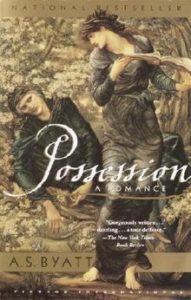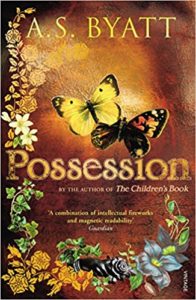

“I cannot let you burn me up, nor can I resist you. No mere human can stand in a fire and not be consumed.”
*
“This improbably buoyant novel combines Shakespearean romance (chaste lovers, guilty passion, children lost and found), detective novel suspense (lost correspondence, visits to scenes of the crime, a coffin disinterred on Halloween), satire on academic fashions (Byatt has a wonderful ear for the idioms of her less than attractive Americans), and a pastiche of styles from Browning to Emily Dickinson.
…
“Possession is not just satire; it’s mostly romance. Our chaste lovers roam through the beauties of the British landscape and the Breton countryside in France. They don’t find many clues about Ash and Christabel, but they do discover much about themselves.
At times, Byatt’s novel reads like a mixture of Jackie Collins and Vladimir Nabokov. The steamy stuff happens not between Roland and Maud (as children of the late 20th century, they minimalize everything, including sex) but between Ash and Christabel.
Byatt has been criticized for breaking the form of the romance and allowing us direct views of the past. We see it in letters, journals, and direct narrative. Literary rules notwithstanding, this running comparison between the lives of the literary detectives and the lives of their authors gives the book its point.
…

“Byatt raises a number of questions: Do we really want to know all about our favorite writers? Does biography provide real insights into what we care about most in books?
…
“The magic of this book about books springs from the fact that its reader comes to identify with Roland and Maud. This postmodern romance tells us much about why we read romances.
While her earlier novels seemed sometimes swamped by their literary baggage, something in Possession makes the literary hocus-pocus genuinely fascinating, even inspiring.

“Shrewd, even cutting in its satire about how literary values become as obsessive as romantic love, in the end, Possession celebrates the variety of ways the books we possess come to possess us as readers.
What reader has not felt shadowed, even haunted by the book he or she is reading at the time? Is it going to be life or art in your life? In helping readers to become self-conscious of just what they do when they read, Byatt has not only written a spellbinding romantic novel, she has helped us understand why as readers we wouldn’t have it any other way.
Brilliantly put together, warm, witty and wise, Possession deserves its laurels and more: It deserves readers galore.”
–Thomas D’Evelyn, The Christian Science Monitor, November 16, 1990

